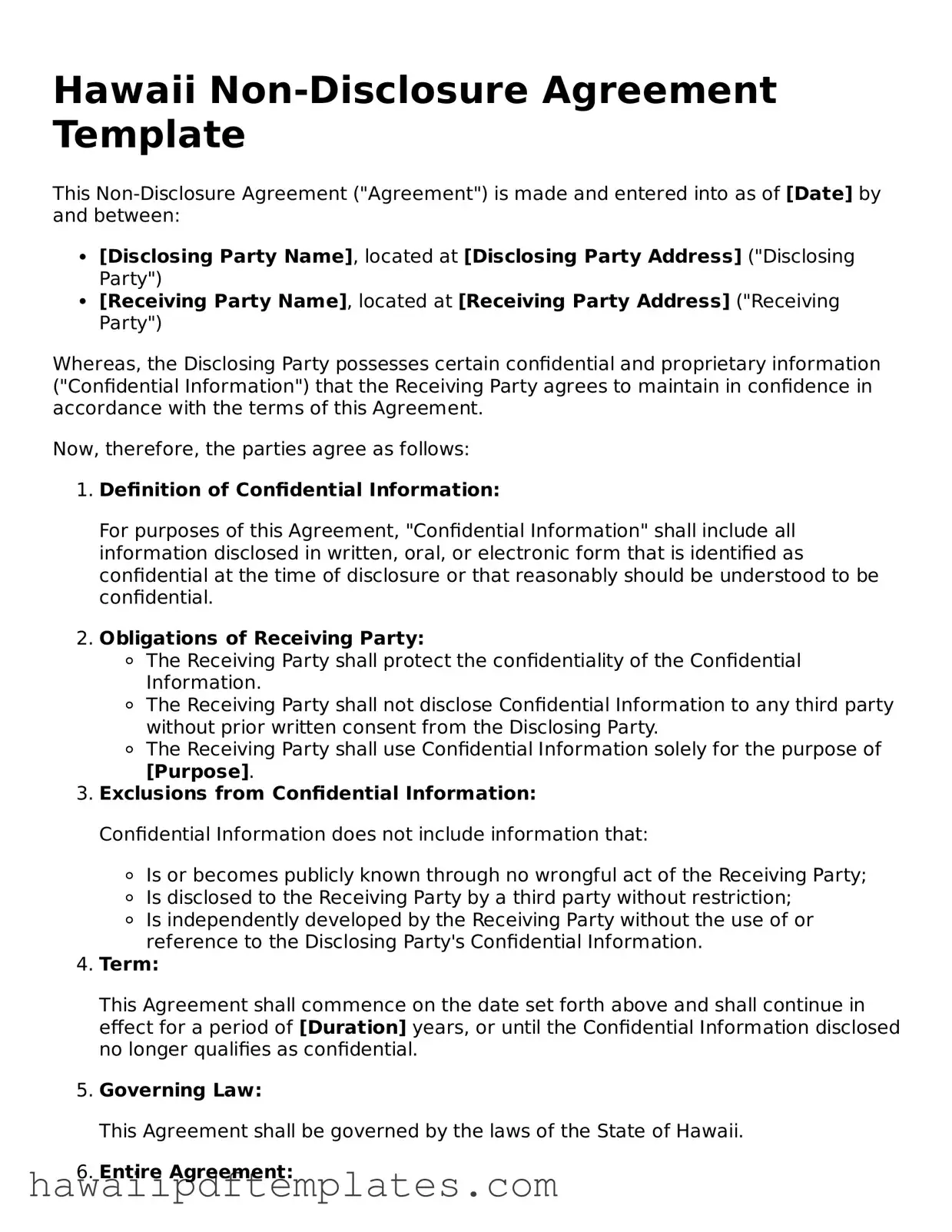Free Non-disclosure Agreement Document for Hawaii State
Frequently Asked Questions
-
What is a Hawaii Non-disclosure Agreement (NDA)?
A Hawaii Non-disclosure Agreement is a legal document that protects confidential information shared between parties. It ensures that sensitive information remains private and is not disclosed to unauthorized individuals or entities.
-
When should I use a Non-disclosure Agreement?
You should use an NDA when sharing sensitive information with another party, such as during business negotiations, partnerships, or when hiring employees who will have access to proprietary information.
-
Who can sign a Hawaii NDA?
Both individuals and businesses can sign a Hawaii NDA. This includes employees, contractors, partners, and even potential investors who may have access to your confidential information.
-
What types of information can be protected?
Typically, an NDA can protect trade secrets, business plans, financial data, client lists, and any other proprietary information that you want to keep confidential. It’s important to clearly define what information is considered confidential in the agreement.
-
How long does the confidentiality last?
The duration of confidentiality can vary. Most NDAs specify a time frame, often ranging from one to five years. However, some information, like trade secrets, may remain confidential indefinitely.
-
What happens if someone breaches the NDA?
If a party breaches the NDA, the injured party can seek legal remedies. This may include monetary damages or an injunction to prevent further disclosure. The specific consequences should be outlined in the NDA.
-
Is a verbal agreement sufficient?
While a verbal agreement can be made, it’s not advisable. A written NDA provides clear evidence of the agreement and its terms, making it easier to enforce if necessary.
-
Do I need a lawyer to create an NDA?
While you can create an NDA without a lawyer, it’s often beneficial to consult one. A legal professional can help ensure that the document meets all necessary legal requirements and adequately protects your interests.
-
Can I modify a standard NDA template?
Yes, you can modify a standard NDA template to fit your specific needs. Just be sure that any changes you make do not compromise the agreement’s effectiveness or legality.
-
Where can I find a Hawaii Non-disclosure Agreement template?
You can find templates online through legal websites or office supply stores. Ensure that any template you choose is specific to Hawaii laws to ensure compliance and effectiveness.
Other Common Hawaii Forms
Bill of Sale Atv - Buyers should review the details carefully before signing the document.
The California Lease Agreement form is a legally binding document that outlines the terms and conditions between a landlord and a tenant for renting residential or commercial property. This form serves as a critical guide to protect the rights of both parties, ensuring clarity and mutual understanding regarding rent, duration, and responsibilities. For more detailed templates and guidance, you can refer to Top Forms Online, which provides valuable resources for both landlords and tenants. By carefully reviewing and signing this document, both parties can foster a harmonious rental relationship.
Hawaii DNR Order - Documenting a DNR order is a proactive step in managing end-of-life care preferences.
Steps to Writing Hawaii Non-disclosure Agreement
Filling out the Hawaii Non-disclosure Agreement form is a straightforward process that requires attention to detail. Once you have completed the form, you will be ready to move forward with the necessary steps to ensure that your confidential information is protected. Below are the steps to guide you through the process of filling out the form.
- Begin by downloading the Hawaii Non-disclosure Agreement form from a reliable source.
- Read through the entire form carefully to understand its structure and requirements.
- Fill in the date at the top of the form where indicated.
- Provide your full name and address in the designated sections.
- Identify the party with whom you are entering the agreement by filling in their name and address.
- Clearly state the purpose of the agreement in the specified area.
- Outline the confidential information that will be protected under this agreement.
- Review any additional clauses or terms included in the form and adjust as necessary.
- Sign and date the form at the bottom where required.
- Make a copy of the completed form for your records before submitting it.
Misconceptions
Misconceptions about the Hawaii Non-disclosure Agreement (NDA) can lead to misunderstandings regarding its purpose and implications. Below are seven common misconceptions, along with explanations to clarify each point.
- 1. NDAs are only for large corporations. Many believe that only big businesses use NDAs, but they are also essential for small businesses and individual entrepreneurs to protect sensitive information.
- 2. NDAs are legally binding in all circumstances. While NDAs can be enforceable, certain conditions may render them void, such as if the information is already public or if the agreement lacks mutual consent.
- 3. Signing an NDA means you cannot talk to anyone about your work. NDAs restrict sharing specific confidential information, but they do not prevent individuals from discussing their general work or experiences.
- 4. All NDAs are the same. Each NDA can vary significantly in terms of scope, duration, and terms. It is crucial to read and understand the specific agreement before signing.
- 5. NDAs only protect the disclosing party. While the disclosing party benefits from the NDA, the receiving party also gains protection by ensuring that sensitive information is not misused.
- 6. NDAs are only relevant during employment. NDAs can remain in effect even after the employment relationship ends, depending on the terms outlined in the agreement.
- 7. You cannot negotiate the terms of an NDA. Many individuals assume that NDAs are non-negotiable. However, it is often possible to discuss and modify terms to better suit both parties' needs.
Understanding these misconceptions is vital for anyone considering entering into a Non-disclosure Agreement in Hawaii. Proper awareness can lead to more informed decisions and better protection of sensitive information.
